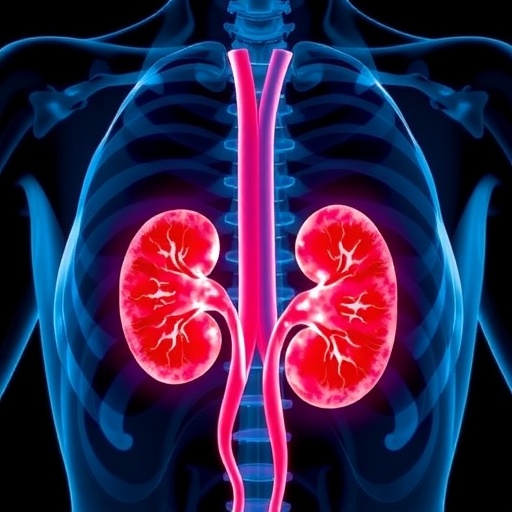A groundbreaking Phase 3 clinical trial, KEYNOTE-426, has delivered compelling evidence that a combination of pembrolizumab and axitinib significantly enhances long-term survival outcomes in patients with advanced clear cell renal cell carcinoma, the predominant subtype of kidney cancer. Published recently in Nature Medicine, this study presents comprehensive data from over five years of follow-up, underscoring the durable clinical benefits of this dual-drug regimen compared to the standard monotherapy with sunitinib.
The trial’s design centered on comparing the efficacy of pembrolizumab, a programmed cell death-1 (PD-1) receptor immune checkpoint inhibitor, paired with axitinib, a vascular endothelial growth factor (VEGF) receptor tyrosine kinase inhibitor, against sunitinib alone, which also targets VEGF receptors but lacks the immunomodulatory mechanism. Importantly, patients enrolled were treatment-naive, confronting advanced stages of clear cell renal cell carcinoma, which traditionally carries a dismal prognosis.
Pembrolizumab’s mechanism involves the potentiation of the immune system’s antitumor response by reactivating T-cell mediated cytotoxicity, which tumors often evade by exploiting immune checkpoint pathways. Concurrently, axitinib inhibits angiogenesis — the physiological process where new blood vessels form from pre-existing vessels — effectively starving tumors of nutrients and oxygen essential for growth and metastasis. This dual targeting of the tumor microenvironment and immune evasion pathways constitutes a paradigm shift in treating advanced kidney malignancies.
.adsslot_0ITNkz6WJP{ width:728px !important; height:90px !important; }
@media (max-width:1199px) { .adsslot_0ITNkz6WJP{ width:468px !important; height:60px !important; } }
@media (max-width:767px) { .adsslot_0ITNkz6WJP{ width:320px !important; height:50px !important; } }
ADVERTISEMENT
Early findings from the KEYNOTE-426 trial were initially reported in 2019, showing promising improvements in objective response rates, progression-free survival, and overall survival with pembrolizumab-axitinib versus sunitinib at a median follow-up of just over a year. The current data set extends this follow-up beyond five years, offering unprecedented insights into the long-term benefits and safety profile of this combination therapy.
The extended analysis reveals that patients receiving pembrolizumab plus axitinib achieved a median overall survival of 47.2 months, outperforming the sunitinib cohort’s 40.8 months. Moreover, progression-free survival — the length of time during and after treatment that a patient lives without disease progression — was significantly prolonged, with median durations of 15.7 months versus 11.1 months, respectively. The objective response rate further highlights the superiority of the combination therapy, with 60.6% of patients responding compared to 39.6% in the monotherapy group.
Beyond survival metrics, the study rigorously evaluated a suite of biomarkers aimed at dissecting tumor biology and predicting therapeutic response. Among these were an 18-gene T-cell-inflamed gene expression profile, an angiogenesis-related gene signature, and PD-1 ligand expression levels. These molecular markers provide a window into the tumor microenvironment’s immune dynamics and vascular characteristics, potentially refining patient stratification for personalized treatment regimens.
Notably, the predictive utility of these RNA-based biomarkers showed promise in identifying subsets of patients likely to derive enhanced benefit from immunotherapy combined with antiangiogenic agents. However, the authors caution that while these findings are provocative, they necessitate further validation through prospective clinical trials before being integrated into routine clinical practice.
Crucially, the data suggest that giving pembrolizumab plus axitinib as a first-line regimen confers a survival advantage across different biomarker-defined subgroups, reinforcing its role as a broadly applicable standard of care. This has important clinical ramifications, as biomarkers currently available do not yet robustly guide initial therapeutic choice in advanced renal cell carcinoma.
The implications of these findings extend beyond efficacy; treatment tolerability and quality of life are paramount in this often frail patient population. The combination therapy demonstrated a manageable safety profile over the prolonged follow-up period, with adverse events consistent with the known pharmacological effects of checkpoint inhibitors and tyrosine kinase inhibitors, including immune-related toxicities and hypertension.
The success of pembrolizumab plus axitinib marks a significant stride forward in overcoming the historically poor outcomes associated with metastatic kidney cancer. It exemplifies the transformative potential of integrating immunotherapy with targeted agents, harnessing complementary mechanisms to dismantle tumor defenses.
Brian Rini, MD, the study’s lead investigator and medical oncologist at Vanderbilt-Ingram Cancer Center, underscores the trial’s uniqueness, citing KEYNOTE-426 as having the “longest follow-up duration among trials combining PD-1 inhibitors with VEGF receptor inhibitors.” This extensive observation period offers invaluable data on the durability of responses and long-term survival, aspects critically important to patients and clinicians.
The research was partially funded and conducted in collaboration with Merck Sharp & Dohme LLC, reflecting the growing trend of industry partnerships in oncology clinical trials which accelerate drug development pipelines and bring novel therapies to patients faster.
In summary, the KEYNOTE-426 trial’s final analysis cements pembrolizumab plus axitinib as an effective first-line treatment option offering sustained survival benefits in advanced clear cell renal cell carcinoma. While biomarker exploration paves the way for future precision oncology endeavors, current evidence supports broad application of this combination irrespective of molecular subtype, heralding a new era in managing advanced kidney cancer.
Subject of Research: Advanced clear cell renal cell carcinoma treatment using pembrolizumab plus axitinib versus sunitinib.
Article Title: Pembrolizumab plus axitinib versus sunitinib for advanced clear cell renal cell carcinoma: 5-year survival and biomarker analyses of the phase 3 KEYNOTE-426 trial
News Publication Date: August 1, 2025
Web References:
Nature Medicine article
Initial NEJM publication
References: 10.1038/s41591-025-03867-5
Keywords: Kidney cancer, advanced renal cell carcinoma, pembrolizumab, axitinib, sunitinib, immunotherapy, VEGF receptor inhibitor, combination therapy, biomarker analysis, Phase 3 clinical trial
Tags: advanced kidney cancer therapyangiogenesis inhibition in tumorsclear cell renal cell carcinoma treatmentdual-drug regimen for kidney cancerdurable clinical benefits in cancer therapiesimmune checkpoint inhibitors in cancerKEYNOTE-426 clinical trial resultslong-term survival outcomes in cancerpembrolizumab and axitinib combination therapyprogrammed cell death-1 (PD-1) therapytreatment-naive patients in oncologyVEGF receptor tyrosine kinase inhibitors





